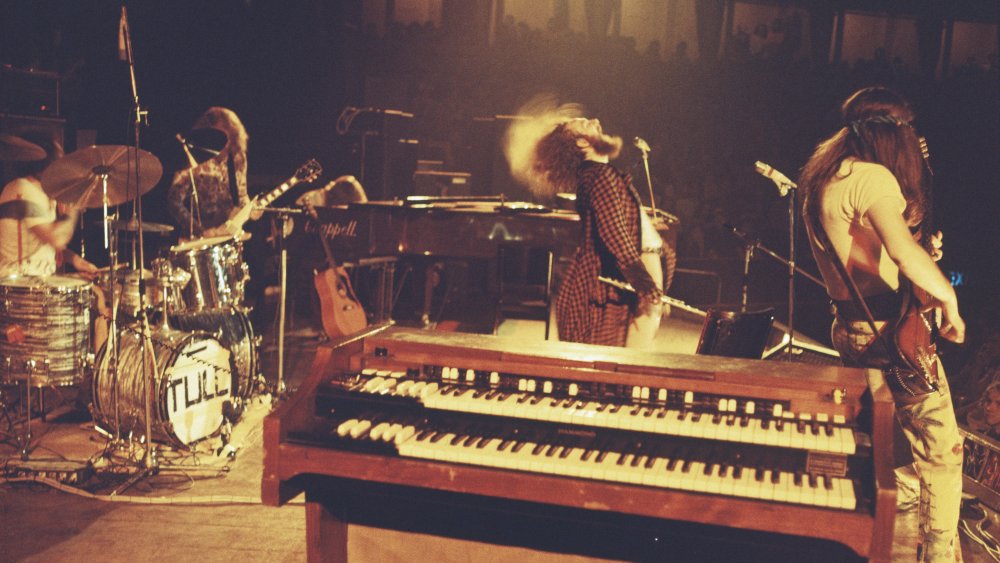The Untold Truth Of Jethro Tull
It is one of the most notorious incidents in the history of music awards. In fact, it is one of the most notorious incidents in the history of awards in general, one that never fails to raise a titter from those who hear or recall it.
Back in 1989, the music industry was going through some big changes in terms of the genres receiving mainstream attention. Like hip-hop, metal began to see its popularity soar, with the genre commanding a huge market that the music industry could no longer ignore. Looking to keep with the times and present a fair overview of the music landscape of the late eighties, the organizers of the Grammy awards took it upon themselves to create a new prize category for the 31st ceremony: "Best Hard Rock/Metal Performance."
Among the nominees were such heavy rocking luminaries as AC/DC and Iggy Pop, along with the highly influential heavy metal band Metallica, whose album ...And Justice For All was considered the far and away favorite to take the award.
On the night, however, another record was given the gong: The Crest of a Knave, the latest album by British group Jethro Tull, whose twenty-year career had been characterized by playful yet ambitious meanderings into folk, blues, and prog rock, as well as the continuous deployment of traditional folk instruments such as mandolins and, as something of a signature, the flute, played by the group's leader, frontman and primary songwriter Ian Anderson.
Reportedly, the Grammy audience was seething. Not only was the Jethro Tull win considered a snub to the hugely-popular Metallica –- who had, in fact, just performed a live version of "One" to the assembled Grammy audience just moments before the announcement -– but it was clear that the category itself was a huge error of the part of the Grammy organizers. As they later admitted, Jethro Tull was "arguably the least hard or metal of the nominees." The winners didn't even show up, reportedly on the advice of their record label who were certain they could not win.
Jethro Tull: an uncategorizable band
Jethro Tull is now mainly remembered by many heavy rock heads as the punchline to this story, but the fact is that the band was as deserving as any of a Grammy at the time; the problem was, no one could put their finger on exactly what the band was up to. Though their roots were in blues and folk, Jethro Tull had been pushing the boundaries of rock for years and, by the time of their Grammy nomination, had plenty of heavy tunes under their belt from 1971's Aqualung to 1988's The Crest of a Knave -– but as Ian Anderson himself would argue, the broader palette of instruments and influences adopted by Jethro Tull meant they were always going to be a questionable fit when placed in a genre category that is defined by its narrow sonic parameters.
Anderson described his attitude towards metal in an interview with KERRANG! following the GRAMMY fiasco: "Maybe the problem is that Metal's become a bit too one-dimensional. Bands who do the big stuff in tight spandex trousers leaping off the drum riser. Too much high energy without relief. But I have MTV, and the best thing on all week is the couple of hours of Metal. It's fun and mock-menacing and I love it. It's a special phenomenon and a very valuable thing, but it's certainly not original."
Highly influential and astoundingly popular
Speaking to KERRANG!, Anderson gave his own opinion of what was going through the heads of the thousands of Grammy voters –- who tend to be longtime veterans of the music business -– when they decided en masse to give the award to Jethro Tull: "When we did win, I thought that it's not because of one particular album, but more for twenty years of Jethro Tull being around. They must've thought, "They're not such bad guys after all, so give 'em a Grammy!"
It is more like fifty years that Jethro Tull has been around, and if the heaviness of their music has ever been in doubt, it might be argued that they are deserving of their Grammy for some of the undeniably rocking bands who have claimed them as an influence over the years. Tull's fans include Iron Maiden, Rush, and even Nick Cave, who would often warm-up before Bad Seeds gigs with a cover version of the Tull classic "Locomotive Breath," and who reportedly requested Ian Anderson to introduce him at the MOJO awards in 2008.
But if influence and longevity aren't your bag, there's perhaps one final fact about Jethro Tull that might convince you they are not a group to be scoffed at: that over the course of their long and varied career, they managed to sell an estimated 50 million records worldwide.


